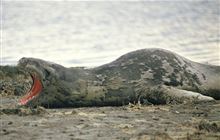Watch out for rare visitor to Hokitika
Archived content: This media release was accurate on the date of publication.
Introduction
A leopard seal has made a rare visit to Hokitika Beach, near Kaihinu, and people are being asked to report sightings to DOC and keep a safe distance.Date: 28 November 2018
Several beach walkers reported a very large seal, around three metres long, lying on the beach and DOC rangers confirmed it was a leopard seal.
The leopard seal appears to be in good condition and rested on the beach for several days, before heading out to sea last Friday (November 23).
DOC Hokitika Operations Manager Nicole Kunzmann says it’s likely the leopard seal is still in the area and will return to the beach.
“People should stay at least 20 metres away from the leopard seal and keep their dogs under control. Exposure to people will be stressful for the seal and upsetting it could put you at risk. These seals have very strong jaws.”
Leopard seals are an Antarctic species. During autumn and winter they head north and individual seals visit New Zealand.
Leopard seals are bigger and more powerful than New Zealand fur seals. They feed on fish, sea birds, penguins and other species of seal.
Leopard seals have slender bodies, huge heads and very large jaws. They are potentially dangerous and while they can appear docile on shore they can lunge quickly and inflict a crushing bite.
Adult female leopard seals can grow to four metres long and weigh up to 500 kg. Male adult fur seals can grow up to 3 m long and weigh up to 300 kg.
Sightings of leopard seals can be reported to the conservation hotline 0800 DOC HOT (0800 362 468) or on 0800 LEOPARD (0800 536 7273).
Contact
For media enquiries contact:
Email: media@doc.govt.nz

